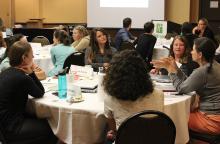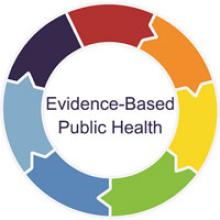In the June session of Hot Topics in Practice, Lactation Consultant Camie Goldhammer reviews how communities of color, especially Native American communities, are reclaiming breastfeeding as an indigenous food source.
Read more »
Scholars in NWCPHP’s Public Health Management Certificate program receive benefits from their collaboration with a coach.
Read more »
NWCPHP sits down with John Thompson, scholar in the 2015–16 Public Health Management Certificate program, to learn how his integrated project helped shape his professional growth.
Read more »
Public Health Management Certificate scholar John Thompson holding his baby's newborn screening paperwork.
In this session of Hot Topics in Practice, members of the Seattle and King County Heroin and Prescription Opiate Addiction Task Force discuss their attempts to implement “supervised consumption sites” to address the health and social harms of substances.
Read more »
NWCPHP sits down with 2016–17 Public Health Management Certificate program scholar Dorota Carpenedo to learn how the program has enhanced her career.
Read more »
Dorota Carpenedo, scholar in the 2016-17 Public Health Management Certificate program.
In the April session of Hot Topics in Practice, Emily York, MPH, Oregon Health Authority, presents the state’s new climate resilience plan.
Read more »
In this one-hour webinar, Public Health Nurse Deborah Giedosh, EdD, shares how her team developed and delivered public health curriculum to support incarcerated dads and their reentry from the Goose Creek Correctional Center.
Read more »
NWCPHP's new online training is a revised and updated Evidence-Based Public Health series, a nine-part course offering a comprehensive guide to incorporating evidence into public health practice.
Read more »
In the next session of Hot Topics in Practice, representatives from the North Sound Accountable Community of Health discuss unintended pregnancies and expanding contraception access in their area.
Read more »
NWCPHP's new online training helps health professionals work with communities to address vulnerability in public health settings.
Read more »